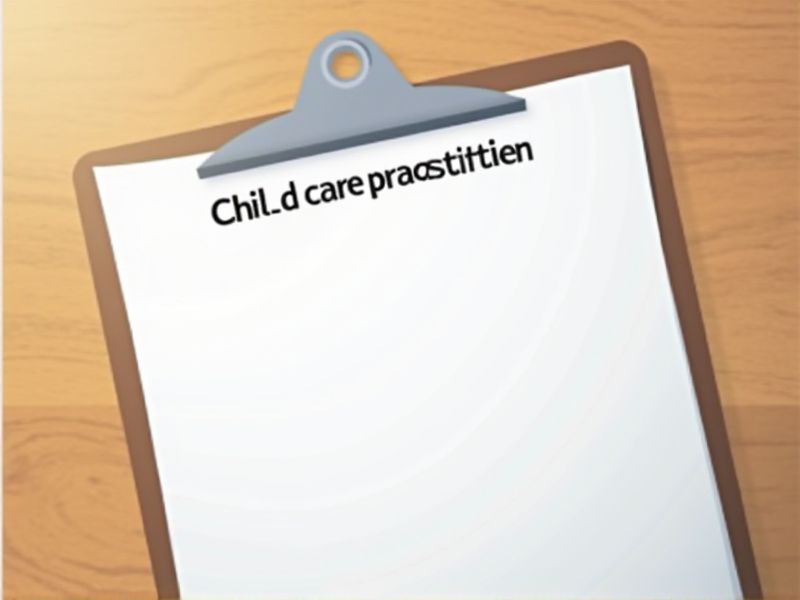
Child care practitioners often work with vulnerable populations, requiring a comprehensive understanding of safety and development protocols. Certifications ensure practitioners possess the knowledge needed to maintain health standards and foster a positive learning environment. Regulatory bodies mandate specific certifications to standardize quality of care across the industry. Below are key certifications that may be required for a career as a child care practitioner.
Child Development Associate (CDA) Credential
Obtaining a Child Development Associate (CDA) Credential leads to enhanced recognition of a practitioner's skills and knowledge in early childhood education. It helps establish a standardized level of competence, ensuring that child care providers adhere to best practices and safety standards. Being credentialed can increase job opportunities and career advancement prospects in the competitive child care industry. Employers often prefer candidates with a CDA, as it indicates a commitment to professionalism and excellence in fostering child development.
CPR and First Aid Certification
Child care practitioners face potential health emergencies, and CPR and First Aid Certification equips them with essential skills to respond effectively. Certification reduces response time during incidents, increasing the chances of positive outcomes for children in distress. Training in CPR and first aid fosters a safer environment, reassuring parents about their child's well-being. Regulatory standards often mandate such certifications, ensuring practitioners meet safety and legal requirements.
Pediatric First Aid Certification
Pediatric First Aid Certification equips childcare practitioners with essential skills to respond effectively to emergencies, reducing the risk of serious outcomes for children in their care. Since young children are more prone to accidents due to their developing coordination and curiosity, having certified first aid knowledge ensures immediate and appropriate action can be taken. Because of their unique physiological characteristics, children may require different first aid techniques compared to adults, and the certification specifically addresses these differences. In emergency scenarios, certified practitioners can provide critical interventions while waiting for professional medical help, ensuring a safer environment in childcare settings.
Early Childhood Education (ECE) Certificate
Holding an Early Childhood Education (ECE) Certificate equips child care practitioners with essential knowledge on child development stages. This certificate ensures practitioners employ age-appropriate teaching strategies that enhance learning outcomes. Regulatory bodies often require the ECE credential to maintain high standards of care in child care settings. Employers tend to prefer candidates with an ECE Certificate as it signifies a commitment to professional standards and ongoing education.
Child Abuse Prevention and Mandated Reporting Certification
Child Abuse Prevention and Mandated Reporting Certification ensures child care practitioners recognize and respond to signs of abuse, providing crucial protection to vulnerable children. This certification equips practitioners with clear guidelines on legally mandated reporting procedures, enhancing their ability to act effectively and prevent further harm. It raises awareness about potential risks and fosters a safer environment for children, promoting their well-being and healthy development. A lack of certification could result in missed signs of abuse, leading to prolonged harm and negative developmental outcomes for affected children.
Safe Sleep/SIDS Prevention Certification
Obtaining Safe Sleep/SIDS Prevention Certification ensures child care practitioners are equipped with essential knowledge to reduce the risk of Sudden Infant Death Syndrome. This certification provides practitioners with current guidelines and safe practices for infant sleep, fostering a safer environment for children in their care. By implementing these protocols, child care facilities can demonstrate a commitment to child safety and compliance with regulatory standards. Educated providers help raise awareness among parents and communities about safe sleep practices, amplifying the overall impact on child health and wellbeing.
Special Needs Childcare Certification
Certification in special needs childcare equips practitioners with specialized skills to effectively support and manage diverse developmental needs. It ensures a safe and inclusive environment for children with disabilities, contributing to their holistic development. The training promotes better communication and personalized care strategies, enhancing overall learning experiences. Certification often fulfills regulatory requirements and reassures parents about the competence of the care provider.
Nutrition and Food Safety Certification
Nutrition and food safety certification ensures child care practitioners understand essential nutritional guidelines, directly impacting children's health and development. A certified practitioner reduces the risk of foodborne illnesses by implementing safe food handling practices. Understanding nutrition helps in planning balanced meals that support growth and cognitive development in children. Certification also instills trust among parents, knowing their children receive care from knowledgeable professionals.
Behavioral Guidance in Early Childhood Certification
Behavioral Guidance in Early Childhood Certification equips child care practitioners with evidence-based strategies to manage diverse classroom behaviors, which directly improves learning outcomes. Certified practitioners are more adept at creating positive and nurturing environments, reducing the likelihood of disruptive incidents. With specialized training, practitioners can identify underlying issues in behavior, leading to timely interventions and support. These skills enhance communication with children and parents, fostering stronger relationships and trust within the care setting.
Autism Spectrum Disorder Awareness Certification
Child care practitioners with Autism Spectrum Disorder (ASD) awareness certification are better equipped to identify early signs of ASD, which can lead to timely interventions. Certification provides practitioners with specific strategies and tools tailored for the unique needs of children with autism, enhancing their overall care. Possessing this certification demonstrates commitment to inclusivity and fosters a supportive environment for children with diverse needs. Knowledge from certification ensures practitioners can effectively communicate with parents, providing reassurance and guidance.
Summary
When you obtain certifications as a child care practitioner, your credibility and marketability significantly increase. This credential can lead to improved employment opportunities and potentially higher income. These certifications demonstrate your commitment to professional development, facilitating the trust of parents and employers. Thus, the quality of care you provide is likely to enhance, benefiting both your career and the children under your care.
